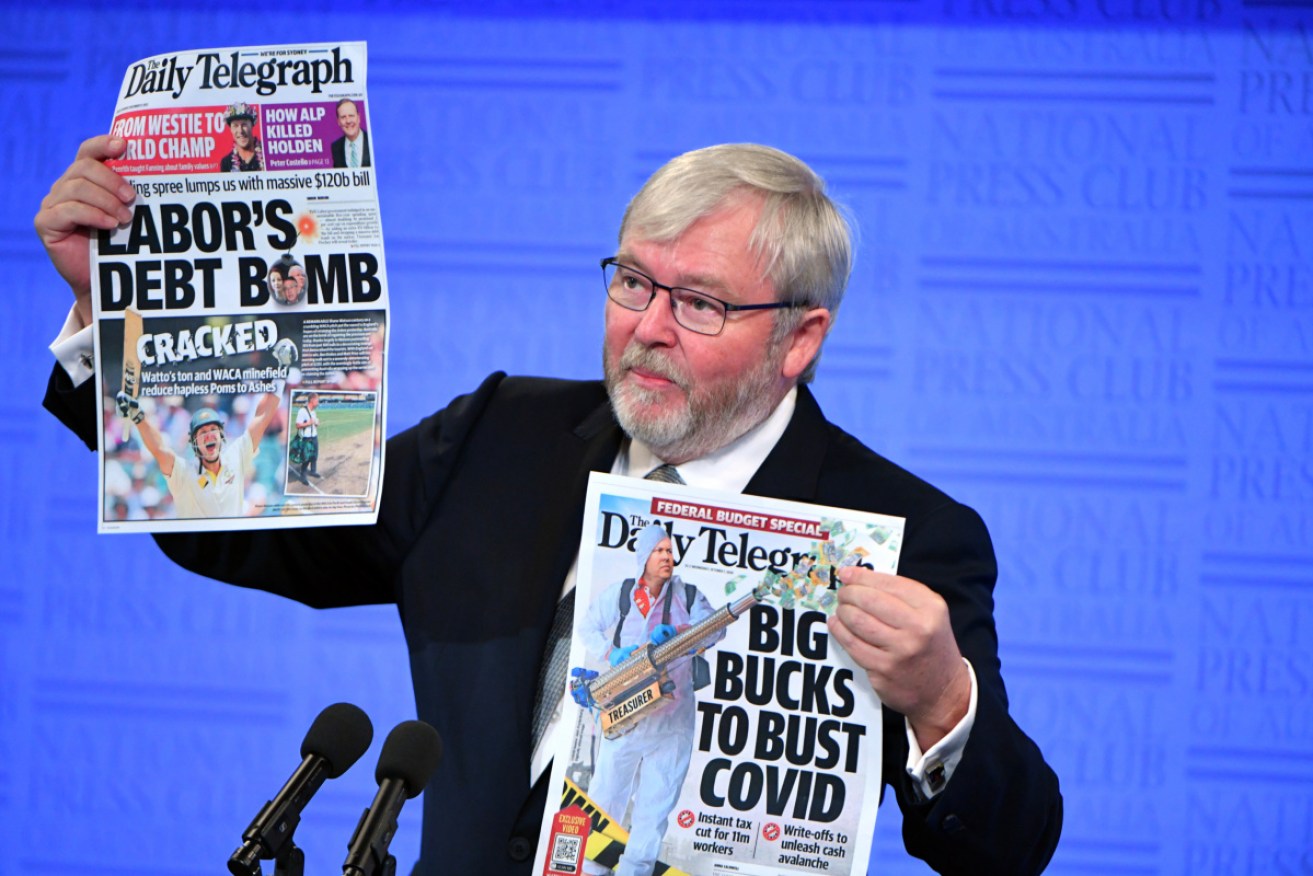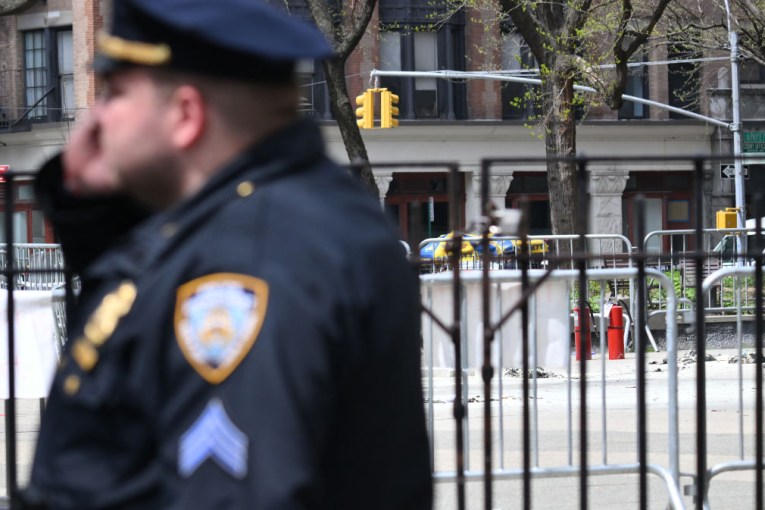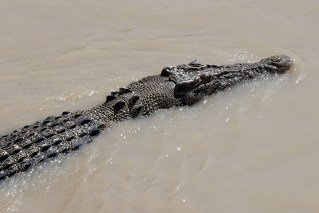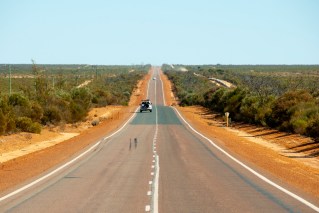The Senate has called for a major inquiry into Australia’s media, this is how it could work


The Senate inquiry followed Mr Rudd's calls for a probe into supposed Murdoch media's bias. Photo: AAP
Former prime minister Kevin Rudd expressed his “profound disappointment” that members of the Coalition government rejected calls for a judicial inquiry into Australia’s media.
A year-long Senate inquiry sparked by Mr Rudd’s calls for a royal commission into News Corp culminated on Thursday with Greens and Labor politicians requesting a judicial inquiry into Australia’s media regulation system.
The senators also called for a single regulator that could field complaints and take action against news outlets and social media companies spreading misinformation or inflammatory content.
But government members of the Senate committee flatly rejected the calls, with one prominent Coalition senator lashing the process as “a shameless political stunt”.
Labor’s shadow communications minister Michelle Rowland also said such an inquiry was not the Opposition’s policy.
Greens Senator Sarah Hanson-Young, who chaired the committee, said it was “clear that the regulatory system for media in this country is broken”.
“Mechanisms that should ensure accountability and responsible reporting are slow and ineffective and we are seeing a rise in misinformation that is causing serious harm in our community,” she said.
Report calls for inquiry
Mr Rudd’s record-breaking petition demanding a royal commission into the Murdoch media empire, which attracted 501,876 signatures, led to the Senate’s communications committee launching an inquiry into media ownership.
Exactly 13 months after the petition was presented to Parliament, the committee’s report was tabled.
Greens and Labor members, making up the majority of the six-person committee, recommended that Parliament set up “a judicial inquiry, with the powers of a royal commission”, to investigate current media regulation systems, and the concentration of media ownership in Australia.
“These senators have gone through more than a year sifting through the evidence for and against a royal commission,” Mr Rudd said in a statement after the report was handed down.
“Their recommendations should be heeded.
“The political parties should be given time and space to digest and consider this report free from interference by Murdoch’s aggressive lobbying campaigns.”
The committee did not specifically recommend a royal commission.

Sarah Hanson-Young. Photo: AAP
A judicial inquiry would be chaired by a judge, and have more powers to compel witnesses than a standard parliamentary committee.
However, unlike a standing committee of parliament that can begin its own inquiries, such an inquiry can only be launched by the federal government or through an act of Parliament.
Despite the Senate numbers making it likely that a motion to establish such an inquiry would pass the upper house, the government’s rejection of the recommendation means it would fail in the House of Representatives, and therefore not be established.
Asked if Labor would back such an inquiry, Ms Rowland told Sky News on Thursday afternoon that she could “rule that out”.
“I can tell you clearly that this is not Labor Party policy,” she said.
Mr Rudd blasted Ms Rowland’s comments, claiming to the ABC she was “very close to News Corporation” and “a wholly-owned subsidiary of the Murdoch media”.
‘Misinformation’ fears
The Labor-Greens majority claimed industry regulator, the Australian Communications and Media Authority (ACMA), had “woefully inadequate” standards for managing online misinformation, and was not “robust” enough.
“The committee is very concerned that the ACMA is not necessarily aware of harmful material that may put people’s lives at risk, without a public complaint being raised,” the majority report said.
“Moreover, it seems that even when complaints are made, the ACMA’s processes cannot address them in a timely and efficient manner.”
The committee had a particular focus on the temporary suspension of Sky News from YouTube in August, following complaints about the broadcaster’s coverage of debunked COVID-19 “cures”.
The committee supported YouTube’s decision to take that action in the specific circumstance, but members claimed it was “alarming” that power could be used “to censor or block potentially valuable news coverage” in future.
Members warned of a “regulatory void” for digital media like Facebook and YouTube.

The committee warned of misinformation online.
Despite digital giants giving evidence to the committee that they were taking action on misinformation – Facebook recently claimed it removed nearly 40 million pieces of hate speech, bullying and harassment in 2021 – the committee noted multiple witnesses were “extremely concerned” about a lack of oversight online.
“It was argued that this encouraged the spread of misinformation online, contributed to a growing distrust of mainstream media, and was an unfair competitive advantage, which allowed them to pursue profits without accountability,” the majority report said.
The majority report claimed a judicial review into media regulation, would have powers that a normal parliamentary committee did not have, including compelling witnesses to give testimony.
It would also be “conducted at arm’s length” of politicians, giving it more independence.
“The committee believes that with the convergence of media platforms brought about by the internet, there is merit in the creation of a single regulator with powers across all platforms,” the majority report said.
“Large media organisations have become so powerful and unchecked that they have developed corporate cultures that consider themselves beyond the existing accountability framework.”
Labor and Greens members claimed current regulatory systems were “fragmented, weak and inconsistent”.
“The problems with the system became increasingly apparent with the dangerous rise in the spread of misinformation both through traditional media and online platforms,” said Senator Hanson-Young, following the report’s release.
“This simply cannot go unchecked and unregulated, the health of our communities and our democracy is at stake.”
Government rejects calls
But Coalition Senator Bragg, committee deputy chair and one of only two government members on the inquiry, ridiculed the report’s calls.
He blasted it as “a shameless political stunt which should not be taken seriously.”
Despite the committee stopping short of Mr Rudd’s calls for a royal commission specifically into News Corp, Senator Bragg claimed the report was targeted directly at the Murdoch empire.
Excluding footnotes, the report mentions the word ‘Murdoch’ nearly 90 times, and ‘News Corp’ or ‘News Corporation’ nearly 200 times.

Nationals Senator Sam McMahon. Photo: AAP
“The recommendations are aimed at one particular organisation which has a large exposure to newspapers,” Senator Bragg claimed in a statement.
“Assessing media concentration by looking at the ownership of newspapers in the digital age is a deeply embarrassing and totally inappropriate measurement.”
Mr Rudd said he was “glad” the Labor-Greens majority on the committee had called for a judicial inquiry.
“A profound disappointment that Liberal & National senators decided again to jump into bed with Murdoch against the Australian people & our democracy,” he tweeted.
In their dissenting reports inside the committee report, Senator Bragg and fellow Coalition member Sam McMahon rejected the calls for a judicial inquiry.
Senator McMahon claimed the majority Greens-Labor report was coloured by “ideologically-driven grievances”, claiming a judicial inquiry would set “an unhealthy precedent”.
“We may not like how the media reports us as politicians specifically, however, the gap between media regulation and censorship is small and Australia’s press deserve all the freedoms they have,” she wrote in her dissenting report.
Senator Bragg recently had his own push for an inquiry into the ABC’s complaints-handling procedures voted down by the Senate, following outrage from the broadcaster’s chair Ita Buttrose.
He claimed it was “absurd” for Labor and Greens members to block his committee, but call for a judicial inquiry of their own.
“Calling for a royal commission without compelling reasons is lazy and irresponsible,” Senator Bragg said.
“They should only be deployed when there is a serious question which can’t be answered through other means. They should not be used to outsource policy at the public expense.”
Other recommendations from the Labor-Greens majority included better financial support for journalism, including sustainable funding for the ABC, SBS and AAP news wire; a permanent trust to fund emerging news outlets and traineeships; better tax rates for news outlets and tax deductions for donations to public interest journalism; and upgrades to the National Broadband Network to better support online journalism.








